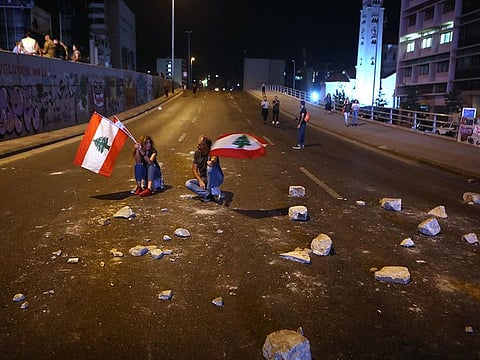Lebanon's Aoun call for protesters to go home inflames unrest
Protesters have demanded a Cabinet without politicians

Beirut: Lebanese President Michel Aoun said the country's next government would have to resemble the lineup brought down by weeks of mass protests and demonstrators should go home before they ruined the country.
The comments, made in a televised interview, provoked public outrage, with thousands descending onto the streets across Lebanon burning tires, blocking roads and renewing demands for the ouster of a ruling class they blame for decades of corruption and mismanagement.
"I ask the Lebanese not to behave with such negativity especially as this can lead to counter negative behavior and, consequently, a confrontation," Aoun said. "If they continue this way, even if we don't give them a slap, the country will die."
Aoun, 84, said formal consultations to name a new prime minister would begin Thursday or Friday, but could be delayed while politicians hammer out the shape of the next cabinet.
Lebanon has been without a government since Prime Minister Saad Hariri resigned late last month in the face of nationwide demonstrations demanding the removal politicians accused of pillaging public coffers to the brink of bankruptcy.
Some of the gatherings had begun to dwindle after Hariri's resignation, but surged as Aoun's speech drew to a close, with protesters demanding he expedite efforts to name a new prime minister or step down himself. Some went as far as to call him "the squatter in the palace" , while others chanted "they are all a bunch of thieves" .
He said it could take days to set a date for consultations with heads of parliamentary blocs for the naming of a new prime minister and added that the best option is for the new Cabinet to include both politicians and technocrats. Protesters have demanded a Cabinet without politicians
Go home
The leaderless, economically driven protests were triggered by new proposed taxes and have quickly evolved into the most spread and most sustained Lebanon has seen in years.
Protesters had poured into the streets Tuesday night closing roads around Lebanon after President Michel Aoun said in a televised interview that there could be further delays before a new government is formed.
He said it could take days to set a date for consultations with heads of parliamentary blocs for the naming of a new prime minister and added that the best option is for the new Cabinet to include both politicians and technocrats. Protesters have demanded a Cabinet without politicians
Prime Minister Saad Hariri resigned his government Oct. 29 in response to the unprecedented nationwide protests since the middle of last month. The protests have snowballed into calls for the government to resign and for the entire political elite that has governed Lebanon since the end of its 1975-90 civil war to step aside.
Protesters are demanding a government made up of technocrats that would get immediately to work on the necessary reforms to address the worst economic and financial crisis. Lebanon is passing through in decades. Politicians are divided among other things over whether the new Cabinet should be made up of experts only or include politicians.
Asked if Hariri would form the new government, Aoun said, "I cannot say before the consultations end."
When asked about the protesters and their demands, he said, "I invited them for a dialogue but did not hear back from them." He urged protesters to go back to their homes because demonstrations are blocking work in the country.
The president also warned that a negative attitude of protesters "will lead to counter negative attitude and this could lead to confrontation." Aoun was apparently referring to government supporters who have also demonstrated in support of the president over the past weeks.
"If you are going to continue this way (protesting) you will be striking at Lebanon, striking at your interests and we will all lose," Aoun said.
He urged people not to rush to banks to withdraw money, saying their deposits will be "guaranteed." He said Lebanon will be eventually able to come out of the crisis, though he didn't elaborate.
Lebanon's banking association said banks would stay closed due to a strike by employees as the country's financial crisis worsens. Banks were supposed to have reopened Tuesday following a three-day closure, but employees went on strike, complaining of aggressive behavior by customers.
Depositors have rushed to withdraw money in recent days amid the rapidly deteriorating economic and financial crisis.
Lebanon's financial troubles have worsened since the mass protests erupted.
The country's lenders have imposed varying capital controls that differ from bank to bank, triggering panic and anxiety among clients. Some have taken out their anger on employees.
The government has said it will continue to meet customer needs through ATM machines, but many Lebanese were unable to withdraw money Tuesday.
Sign up for the Daily Briefing
Get the latest news and updates straight to your inbox





